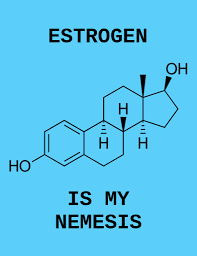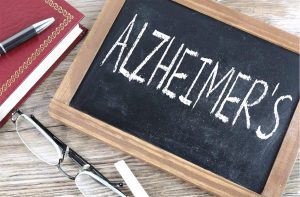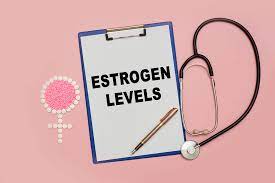The Potential Benefits Of Estrogen On Alzheimer’s Risk
Estrogen Hormone Replacement Therapy and Alzheimer's Disease
Hormone Replacement Therapy can do a lot of amazing things. In the early twenty-first century, scientists are just exploring the tip of the iceberg regarding the benefits of various hormone treatments, including Estrogen, Testosterone, and Human Growth Hormone.
Although research has shown no evidence that Estrogen Replacement Treatments can alleviate the symptoms of Alzheimer's disease, there is  promising evidence that Estrogen Therapy can reduce the risk of Alzheimer's disease in women, otherwise healthy women.
promising evidence that Estrogen Therapy can reduce the risk of Alzheimer's disease in women, otherwise healthy women.
Menopause Problems
As we all know, Menopause is a period of excellent Hormone Imbalance. From puberty to menopause, women experience a reasonably predictable pattern of hormone levels, and their body ultimately benefits from this stability. Upon Menopause, however, hormone levels start to change significantly. Estrogen Levels drop like a rock as the Ovaries significantly reduce their production.
Multiple symptoms are associated with Menopause, and they all hurt life and health. Among these symptoms are:
Cold Sweats
Hot Flashes
Memory Loss
Emotional Instability
Loss of Sexual Desire and Ability
These are the symptoms that women experience explicitly during the period of Menopause. For the most part (except for sexual issues), these symptoms of Menopause dissipate slowly over time.
Long Term Symptoms of Hormone Deficiency
In recent years, however, researchers have discovered many issues related to Hormone Deficiency that put women at risk for the rest of their lives. One risk that seems highly correlated with Estrogen Deficiency after Menopause is Alzheimer's disease.
Alzheimer's is a disease that is much more common among women than men. A woman's risk of developing Alzheimer's is almost double that of a man. Of course, part of that increased risk is because women, on average, have a longer lifespan than their male counterparts, but that only explains a tiny portion of the difference.
Why do Women Get Alzheimer's More than Men?
In recent years, a limited amount of studies have been conducted regarding the connection between Estrogen Deficiency and Cognitive Decline. Still, the research has been illuminating, to say the least.
This research suggests that the administration of Estrogen Hormone Replacement Therapy can have a stimulative effect on women's mental health, assuaging Age-Related Cognitive Decline and even postponing or reducing the risk of Alzheimer's Disease.
For many patients, especially those experiencing Estrogen Deficiency before Menopause, Estrogen Replacement Therapy can be combined with Progestin to maximize the treatment's effectiveness and safety profile.
How Many People Struggle with Alzheimer's in America?
Alzheimer's is one of the worst medical issues plaguing modern American society. It is estimated that four million men and women are afflicted with Alzheimer's today. Considering that twice as many women as men will experience Alzheimer's in their lifetime, this is a significant portion of aging women.
Nearly every person in America intimately knows someone who has struggled with Alzheimer's, whether they had to take care of an immediate family  member or were simply acquaintances. A few years ago, several research teams sought to answer whether Estrogen Replacement Therapy could be a legitimate treatment option for women at risk of Alzheimer's.
member or were simply acquaintances. A few years ago, several research teams sought to answer whether Estrogen Replacement Therapy could be a legitimate treatment option for women at risk of Alzheimer's.
Can Estrogen Treat Alzheimer's?
As a result of their research, they found that Estrogen was ultimately not effective as a means to treat Alzheimer's Disease directly. Although they could not establish Estrogen as a potential Alzheimer's treatment, their research still strongly suggested that Estrogen Therapy could reduce the risk of developing Alzheimer's for women worldwide.
Can Estrogen Prevent Alzheimer's?
There is potential that Estrogen Replacement could significantly delay the onset of Alzheimer's Disease or, at a minimum, postpone the onset of the disease. Even if Estrogen only postpones Alzheimer's, it could still be a handy tool in combination with other treatments that would all but eliminate the risk of Alzheimer's Disease someday in the future.
The Benefits and Risks of Estrogen Replacement Therapy
Countless women across America have turned to Estrogen Treatments as a means to relieve the symptoms of Menopause. Every woman experiences Menopause differently, and some women are either more sensitive to the changes that occur or produce lower baseline levels of Estrogen after Menopause.
Decades of research have proven the effectiveness of Estrogen at reducing the potential tempest associated with Menopause, and medical researchers  have discovered powerful links between Estrogen Replacement Therapy and a reduced risk of Osteoporosis.
have discovered powerful links between Estrogen Replacement Therapy and a reduced risk of Osteoporosis.
Cautious links have also been made between Estrogen Replacement Therapy and reduced risk of heart disease, although this link has not been confidently established. For some women, however, Estrogen Replacement Therapy can increase the risk of breast cancer, although the exact level of risk is not fully discerned.
Although there are certain risks involved with Estrogen HRT, for a considerable number of women, it seems likely and clear that the benefits far outweigh the costs.
Before new research regarding memory and cognition, this was essentially the state of play about the potential benefits and risks of Estrogen Deficiency and Estrogen Replacement. Researchers are becoming keenly aware of how Estrogen and Estrogen Deficiency affects the brain and mental health.
Estrogen and Acetylcholine
In research utilizing both laboratory animals and cultivated brain matter, there is evidence that supports the notion that Estrogen can protect and support the health of neurons in the brain. One way it accomplishes this is by boosting the resting levels of Acetylcholine in the brain.
Acetylcholine acts as a protective force in the brain, safeguarding against the breakdown of brain tissue associated with Alzheimer's disease. One of the physiological symptoms of Alzheimer's is that Acetylcholine Levels drop significantly among patients that suffer from the disease.
In addition, Estrogen Replacement Therapy also seems to reduce the rate at which Beta-Amyloids form in the brain.
What are Beta-Amyloids?
Beta-Amyloid is the primary actor which leads to the physiological deterioration associated with Alzheimer's Disease. Although you have probably never heard of Beta-Amyloid, you probably know what it is, whether you realize it or not. Beta-Amyloids are proteins that, when produced in the brain, leading to the clumps of tangled Amino Acids called Plaques.
Estrogen Research in the 1990s
Before the turn of the century, there were only a few studies regarding the connection between Estrogen Supplementation and Alzheimer's. These studies suggested that Estrogen Replacement Therapy could restore memory and cognitive ability in women suffering from Alzheimer's.
The problem with these studies is that they were primarily minor studies and only evaluated patients over a short period of time. Although the studies showed some promise, they were not powerful enough to establish a significant link between Estrogen and the improvement of Alzheimer's.
In the years following these initial studies, however, three new studies were conducted that intended to explore these potential benefits in a way that could more firmly establish the potential effects of Estrogen Treatment on Memory and Alzheimer's.
The biggest and longest of these studies was released in the Journal of the American Medical Association.
Testing the Hypothesis: Estrogen and Alzheimer's
Ruth Mulnard of Cal-Irvine conducted this study as an Institute for Brain Aging and Dementia representative. This study had a participant pool of 120 patients, half of whom had been discovered to have Alzheimer's disease.
Half of the women in both groups were treated with Estrogen Replacement Therapy, and the other half of both groups were treated with a placebo.
All patients received treatment for twelve months and were regularly tested for alterations in language ability, mood, memory, and other cognitive abilities to monitor any symptoms of cognitive decline.
If Estrogen Replacement Therapy could improve the function of patients with Alzheimer's disease, then the treatment would cause women taking Estrogen to decline more slowly than the patients that did not receive the treatment.
Estrogen Ineffective at Treating Alzheimer's
Sadly, results showed that Estrogen has no effect on patients that were already experiencing symptoms of Alzheimer's. Among the ninety-seven women who finished the study, the women with Alzheimer's taking Estrogen did not experience any more remarkable improvement than the placebo.
Two other studies displayed similar results, with no conclusive evidence that Estrogen could relieve Alzheimer's. Dr. Henderson, a medical researcher from USC Los Angeles, said that he felt the studies were relatively conclusive and that Estrogen Therapy alone probably doesn't have any significant benefits concerning patients currently experiencing Alzheimer's Disease.
Estrogen May Benefit Alzheimer's Patients in Combination with Other Treatments
Although these studies appear to put that aspect of the Estrogen-Alzheimer's Care debate to rest, that does not mean that Estrogen Replacement Therapy does not have other beneficial effects. Even Dr. Henderson feels that there may be a place for Estrogen Treatments when combined with other forms of therapy.
Some researchers feel that Estrogen HRT may have beneficial effects when combined with a standard Alzheimer's treatment known as Aricept (scientific  name: Donepezil). Estrogen shares an important aspect in common with these common Alzheimer's medications: They all have the effect of increasing Acetylcholine in the brain, and there is strong reason to believe that Alzheimer's may have the ability to increase the effectiveness of these other forms of treatment.
name: Donepezil). Estrogen shares an important aspect in common with these common Alzheimer's medications: They all have the effect of increasing Acetylcholine in the brain, and there is strong reason to believe that Alzheimer's may have the ability to increase the effectiveness of these other forms of treatment.
Today, a limited amount of data supports this hypothesis, but the data is promising. Two studies thus far have been conducted concerning Estrogen's ability to supplement existing Alzheimer's treatments.
Data analysis of the studies showed that a small segment of participants was taking Estrogen Treatments in combination with other forms of Alzheimer's medication. Although there were not enough women to lend significance to the results, it shows a certain level of potential, although we should be cautiously optimistic.
Using Estrogen to Prevent Alzheimer's Disease
Although no studies today can confirm Estrogen Replacement as a means to alleviate the effects of Alzheimer's, a number of studies provide evidence that Estrogen may be able to postpone Alzheimer's in women who do not suffer from the disease. There is even hope that it may be a tool for Alzheimer's prevention.
In one of the most recent studies, 472 women were monitored in the Baltimore Longitudinal Study of Aging over the course of sixteen years. Although this study was not intimately concerned with Hormone Replacement Therapy as an Anti-Aging Treatment, the study was performed in a way that allowed a broad scope of analysis.
Among the 472 subjects, a number chose Estrogen Hormone Replacement Therapy, while many others went without such treatment. Looking back at the data, researchers found that women that chose to utilize Estrogen during and after menopause experienced Alzheimer's disease at half the rate of women that did not.
Small Pool of Participants Still Provides Promise
Although this research shows an immense amount of promise, more work needs to be done to assess the viability of Estrogen to Prevent Alzheimer's more accurately. At this point, the findings of the BLSA study amount simply to an exciting observation: Estrogen may be one of the most potent tools women have against Alzheimer's and general Cognitive Decline.
Although we should be excited at such a prospect, we must also realize that other factors may be at play. Women who choose Estrogen Replacement Therapy may experience these benefits for reasons unrelated to treatment, including genetics or nutrition.
In addition, the reduced risk of Alzheimer's could also be the result of other factors that help them live healthier lives.
In general, women that choose Estrogen Replacement tend to be more conscientious about their health. Women who take Estrogen also tend to have more robust health care plans, allowing them access to better treatments and health and wellness programs.
More Estrogen-Alzheimer's Studies Underway
Today, three more studies are being conducted to more clearly show the benefits of Estrogen Replacement Therapy in regard to Alzheimer's. Of these three studies, two are being conducted by scientists in the United States, and a third by researchers in Great Britain.
Because these studies were designed specifically to uncover the potential benefit of Estrogen Replacement for Alzheimer's, they will be able to declare,  once and for all, the Effect of Estrogen on Alzheimer's Patients.
once and for all, the Effect of Estrogen on Alzheimer's Patients.
All three of these studies will be placebo-controlled and double-blind to maximize the predictive value of the data. The patients will be tested and analyzed for cognitive ability at random intervals. Researchers hypothesize that the combination of Estrogen and modern Alzheimer's care will slow down the rate at which the disease progresses.
As we all know, Alzheimer's is a dreadful disease for which no known cure exists. Suppose it indeed does have the ability to benefit women about Alzheimer's risk or treatment. In that case, it will completely change how we think about Estrogen Replacement Therapy in the future.
The Potential of Hormone Replacement
Even if Estrogen simply delays Alzheimer's or slows down the rate of decline associated with the disease, it will likely become a recommended treatment, especially for women with a high risk for the disease due to genetics or other factors.
Even if the link between Estrogen and Alzheimer's Prevention is weak, it will significantly broaden our knowledge of the disease and how it should be most effectively treated.
Who Should Consider Estrogen Replacement Today?
Until the benefits of Estrogen for Alzheimer's can be fully proven, women should consider Estrogen Replacement Therapy regarding other, more concrete benefits, including cardiovascular health, Osteoporosis prevention, and relieving the harshness of Menopause.
Although conclusive evidence regarding Alzheimer's and Estrogen Treatment is still years away, there are numerous reasons to consider Estrogen for Your Health.
- 0001) Research Hgh For Patients Over 60 [Last Updated On: June 8th, 2025] [Originally Added On: September 30th, 2020]
- 0002) Natural Hormone Replacement Abc News 13 [Last Updated On: October 25th, 2025] [Originally Added On: October 2nd, 2020]
- 0003) My Own Experience With Human Growth Hormone Case Study [Last Updated On: February 10th, 2025] [Originally Added On: October 3rd, 2020]
- 0004) Ipamorelin Alternative To Hgh Injection Therapy [Last Updated On: February 10th, 2025] [Originally Added On: October 4th, 2020]
- 0005) Human Growth Hormone Therapy For Adult Hgh Deficiency Do The Benefits Stack Up [Last Updated On: January 18th, 2026] [Originally Added On: October 5th, 2020]
- 0006) Human Growth Hormone Rehabilitation Benefits [Last Updated On: June 1st, 2025] [Originally Added On: October 6th, 2020]
- 0007) HRT [Last Updated On: May 5th, 2025] [Originally Added On: October 7th, 2020]
- 0008) Hormone Replacement Therapy With Pellet Implants [Last Updated On: May 4th, 2025] [Originally Added On: October 8th, 2020]
- 0009) Omnitrope Bio-identical HGH Injections [Last Updated On: January 17th, 2026] [Originally Added On: October 9th, 2020]
- 0010) Imported Human Growth Hormone Is Illegal In The United States [Last Updated On: January 16th, 2026] [Originally Added On: October 10th, 2020]
- 0011) Igf-1 Stimulates The Growth Of Motor Neurons In The Brain [Last Updated On: June 2nd, 2025] [Originally Added On: October 11th, 2020]
- 0012) Estrogen Hormone Replacement Therapy May Diminish Alzheimers Disease Risk [Last Updated On: January 15th, 2026] [Originally Added On: October 12th, 2020]
- 0013) Dr. Hotze Talks About A Natural Solution For Depression. [Last Updated On: October 27th, 2025] [Originally Added On: October 14th, 2020]
- 0014) Anastrozole Research Study [Last Updated On: January 11th, 2026] [Originally Added On: October 15th, 2020]
- 0015) Symptoms Of Hormonal Imbalance In Women: What To Look For [Last Updated On: March 15th, 2025] [Originally Added On: May 12th, 2021]
- 0016) Beware of Fake Hormone Booster Pills – Sign Up for the Real Deal [Last Updated On: February 27th, 2025] [Originally Added On: December 21st, 2022]
- 0017) Chronic Fatigue versus Hormone Deficiency: How Can Patients and Doctors Tell the Difference? [Last Updated On: April 9th, 2025] [Originally Added On: January 18th, 2023]
- 0018) Ipamorelin: A Safer, Cost-Effective Alternative to HGH Therapy [Last Updated On: February 13th, 2025] [Originally Added On: February 13th, 2025]
- 0019) Treatment of Hormone Deficiencies [Last Updated On: February 15th, 2025] [Originally Added On: February 15th, 2025]
Word Count: 2221






